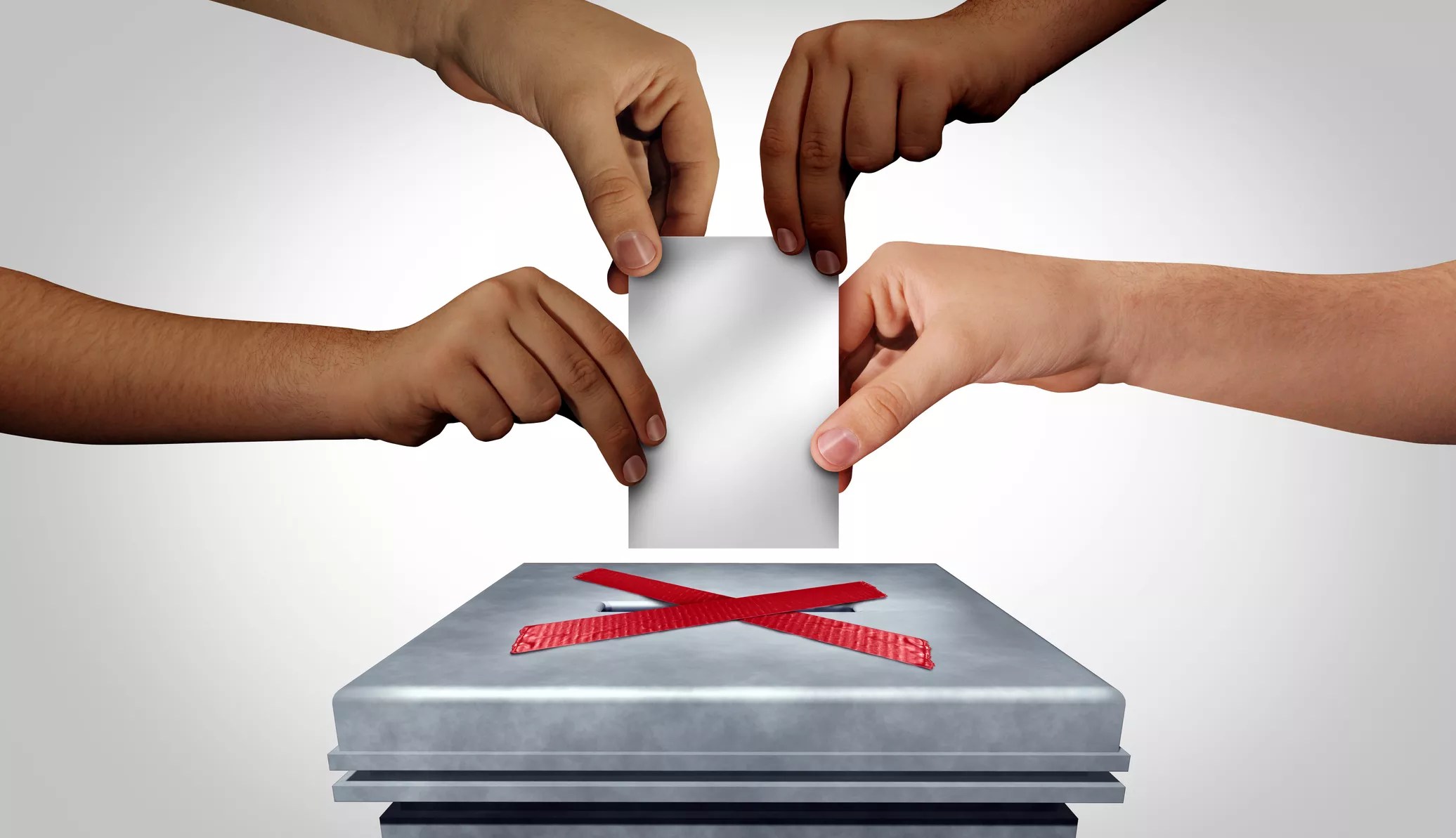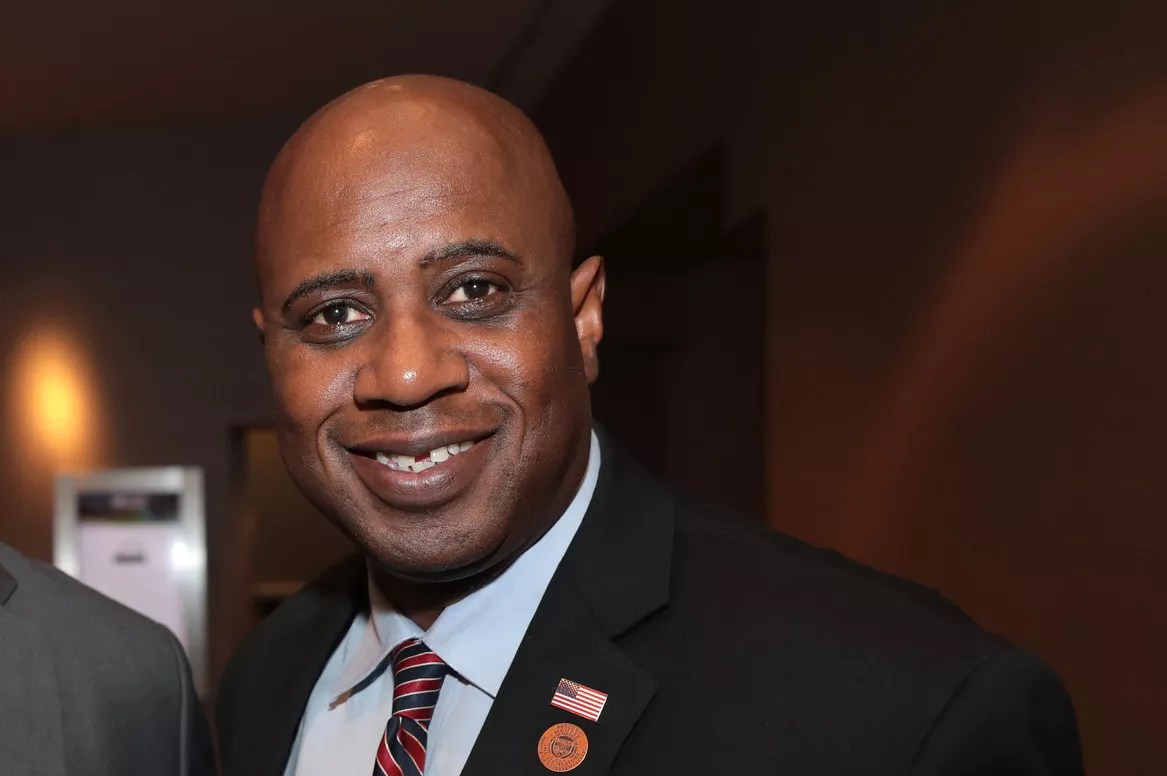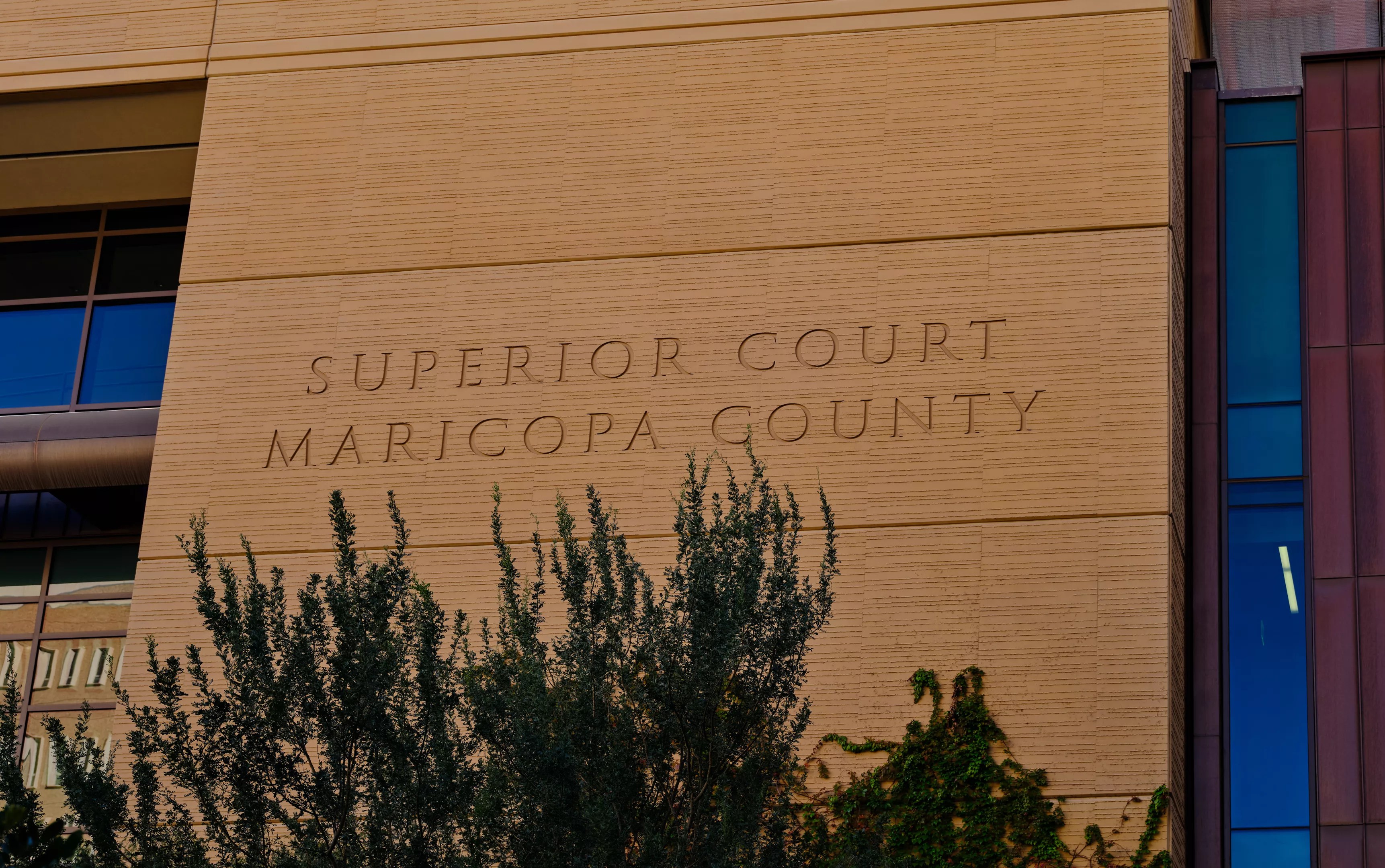
wildpixel/Getty Images

Audio By Carbonatix
Earlier this month, Kelly received her ballot in the mail. Her heart sank.
“As soon as I saw that big yellow envelope,” she said, “I was like, ‘Oh, Lord.'”
What depressed her was not the task of voting in the Nov. 5 election. Now in her early 50s, she has proudly performed that civic duty every election cycle. “I’m someone who, since I was 18, exercised my right to vote,” she said. This election is as important as any, and yet Kelly will not be able to return her ballot this year.
That’s because on Oct. 2, just days before her ballot arrived, Kelly received a letter from the Maricopa County Recorder’s Office. “We received information from the court system indicating that you have been convicted of a felony,” the notice read. According to Arizona law, “your voter registration has been cancelled,” it continued.
“When I read it,” Kelly said, “it really got me down.”
A felony conviction would indeed bar Kelly from voting, but she doesn’t have one. (She agreed to speak to Phoenix New Times on the condition of anonymity. “Kelly” is a pseudonym.) According to her sentencing order, she pled guilty to an undesignated offense, a category of offense created in 2022 when a criminal justice reform bill signed by former Gov. Doug Ducey went into effect.
According to the law, undesignated offenses are treated as misdemeanors until the defendant completes probation, at which time the sentence officially becomes designated as a misdemeanor. However, undesignated offenses are treated like felonies for certain purposes – for example, Kelly is not allowed to own a gun – but the cancellation of one’s voting rights is not among them.
When Kelly entered her plea and was given her sentence in September, she thought her six-month legal saga was over. Now, because of someone else’s error, she’s been disenfranchised.
“I didn’t know if I should be like, ‘Well, here’s another negative thing happening from this situation,'” she said. “But then I was like, ‘No, why are they suspending my voting rights?'”

This cancellation notice was sent by the Maricopa County Recorder’s Office to voters who wrongly appeared on the Clerk of Court’s felony convictions list.
Courtesy of Kelly
Kelly is, unfortunately, not alone. New Times examined hundreds of court records, revealing a persistent record-keeping problem that the Maricopa County Superior Court now says it’s working to fix. In the course of that research, New Times identified at least one other person who lost the right to vote over a felony conviction they don’t really have. There could be many, many more.
The errors, which are the result of a database issue with the Superior Court, led to an inaccurate report of people with felony convictions that the Maricopa County Clerk of Superior Court sends every month to the Arizona Secretary of State. By law, the agency must collaborate with county recorder’s offices to remove those people from the voter rolls.
Through a public records request, New Times obtained the September edition of that report from the Clerk of Superior Court. Among the more than 1,300 entries, New Times found at least 32 people who had been convicted not of felonies but of undesignated offenses. None appeared to have prior felony convictions that would affect their right to vote.
It’s unclear how many of those 32 residents were previously registered to vote or attempted to register after their convictions. Citing the crush of election-related requests leading up to Nov. 5, the Maricopa County Recorder’s Office said it has not been able to crosscheck their names with its records. But at least two of those 32 – including Kelly – have received cancellation notices from the recorder’s office.
New Times has not been able to examine felony convictions reports sent to the Secretary of State prior to September. Similarly, New Times has not been able to check the records of Arizona’s other 14 county clerks of court.
But for however many citizens are impacted, the process of correcting the issue almost certainly will last beyond Election Day. They will have to sit this one out.

Former state Rep. Walt Blackman, a Republican, sponsored the bill that created the new category of “undesignated offense.”
Gage Skidmore/Flickr/CC BY-SA 2.0
What’s an undesignated offense?
The category of undesignated offense was created precisely to preclude the kind of legal hurdles Kelly and other disenfranchised voters now face.
Prior to July 2022, the justice system worked a bit differently. First-time offenders who committed certain nondangerous, nonrepetitive offenses could be charged with class 6 felonies, the lowest level of felony. Upon completion of probation, those charges could be knocked down to class 1 misdemeanors. But that system saddled low-level offenders with a felony conviction on their records for months or longer.
If they applied for a job or for an apartment during probation, they’d have to disclose their felony convictions – even if those felonies would soon be wiped from their records. When their probation ended, they would have to formally request the court change their offense to a misdemeanor, a step that Arizona Attorneys for Criminal Justice board member Armando Nava said many offenders didn’t realize they had to take.
“A lot of clients thought it was automatic. They’d complete probation, and they’d think, ‘Great, now I have a misdemeanor.’ But it’s not,” Nava said. “They still would have to request it. Years would go by, and they’d still be treated as if they had a felony.”
Nava and AACJ began advocating for a fix. In 2021, former Republican state Rep. Walt Blackman sponsored a solution in House Bill 2162. The bill essentially reversed the order of the probation process. Instead of burdening offenders with a felony that eventually could be knocked down to a misdemeanor, the bill allowed prosecutors to offer the charge of “undesignated offense.”
That means what it says: At the time of conviction, the offense has not yet been designated a felony or a misdemeanor. Only after probation is served and all fines are paid does the court lock it in as one or the other. In the interim, the conviction is considered a misdemeanor, except in six specific circumstances. As outlined in ARS 13-604, those include the loss of gun rights and being subjected to DNA collection. Voting rights are not mentioned.
HB 2162 passed through the state legislature with near-unanimous support and was signed into law by Ducey in April 2021. It went into effect in 2022.
Nava said that since then, “it’s materially better.” Clients who plead to undesignated offenses face fewer barriers to getting jobs and housing while they complete probation. “That was a big impediment to a lot of people,” he said.
Before speaking to New Times, Nava had not heard of people with undesignated offenses losing their voting rights. He has had other clients plead to undesignated offenses who have not had their registration canceled. After reviewing Kelly’s plea documents and sentencing order, he agreed that “nothing about what I’m looking at … would suggest that she should have that revoked.
“To me, it reeks more of a court fuck-up,” he said, “which sadly is common.”

Coding errors in the case management database of the Maricopa County Superior Court erroneously listed dozens of people as having felony convictions in September.
Tony Webster
How did this happen?
A court fuck-up is exactly what it is.
According to Maricopa County Superior Court spokesperson Vincent Funari, the problem stems from codes entered into the court’s case management database, which the clerk of court uses to create its felony convictions report. Defendants convicted of class 6 felonies are supposed to be entered into the database with the code “F6.” Those with class 6 undesignated offenses go into the database with a “U” code.
After being contacted by New Times, Funari said in a statement, the Superior Court conducted a review of the September convictions list. That review found 27 cases for which the wrong code was entered. An additional 630 class 6 undesignated convictions from September were entered correctly into the system.
In response to those errors, Funari said, the Superior Court will conduct “additional training of our court staff on coding class 6 convictions” and make “programming changes to our case management system that will provide quality control over the way in which class 6 convictions are coded.”
Additionally, the court “will be conducting an audit of our case management database going back to July 1, 2022, to ensure that all class 6 convictions have been properly coded. We will work with the Clerk’s Office to provide updated reports to the Secretary of State’s Office regarding any person who has been improperly included on the Felon Voter report.
“The Judicial Branch apologizes to any citizens who have been negatively impacted by this,” Funari’s statement concluded.
In at least six cases found by New Times, however, a coding error is not the problem. In those cases, records show the court accepting a defendant’s guilty plea to a class 6 undesignated offense. However, in the sentencing orders for those cases, the charge had been transposed to a class 6 felony.
One of the defendants in those cases is a client of Craig Rosenstein of Rosenstein Law Group. Unaware of the discrepancy in the sentencing order error, he filed a motion to restore his client’s voter registration, which the court denied on procedural grounds. Contacted by New Times with information about the difference between the plea and sentencing order, Rosenstein said he’ll need to file a nunc pro tunc motion to correct the latter.
That may fix the problem in the long run, but the error is unlikely to be resolved before Nov. 5.
“Our client is, at this point, resigned to the fact that they’re not going to be able to execute their fundamental right to vote and is frustrated,” Rosenstein said.

A spokesperson said the office of Arizona Secretary of State Adrian Fontes is aware of the records mistakes in reports sent by the Maricopa County Superior Court and the Maricopa County Clerk of Court.
Gage Skidmore/Flickr/CC BY-SA 2.0
What happens now?
It’s unclear what, if anything, the Secretary of State or Maricopa County Recorder’s Office can do to restore voter rights before Nov. 5. Spokespersons for both responded to questions from New Times noting that their agencies are statutorily required to strike the names they’re given from the voting rolls.
“Our office cannot provide legal advice, but we encourage voters to seek legal guidance on this matter,” wrote recorder’s office spokesperson Taylor Kinnerup. “However, in most cases, a voter can simply re-register, attesting that they meet the registration requirements.”
The registration deadline for this election passed nearly a month ago, however. According to Darrell Hill, the policy director of the Arizona chapter of the American Civil Liberties Union, that leaves affected voters “stuck between a rock and a hard place.”
“As a person who’s even a trained lawyer,” Hill said, “it’s not really clear to anyone how to respond to such a notice when the court gets it wrong.”
It’s also not clear how long it will take the Superior Court to complete its audit or how it will notify officials in other agencies that manage voter registration. In general, attorneys say, correcting clerical errors with the court is an unnecessarily involved process.
Nava remembers having to file motions with the court when a sentencing order specified the wrong amount of jail time for a client. “It’s very aggravating,” he said. Rosenstein now needs to do the same thing to correct his client’s listed offense, which is only the first task in restoring his voting rights.
“To err is human. Humans make mistakes,” Rosenstein said. “But the difficulty in fixing mistakes is problematic.”
Unfortunately for impacted voters (or should-be voters), the legal system grinds slowly. That means people such as Kelly can only sit back and watch the results come in, knowing that – through no fault of their own – their ballot won’t be among them.
“I thought this was concluded, this is what I had to do,'” Kelly said of her court case. “Then it’s like, ‘Bam, here you go. You’re being punished again when you shouldn’t be.'”